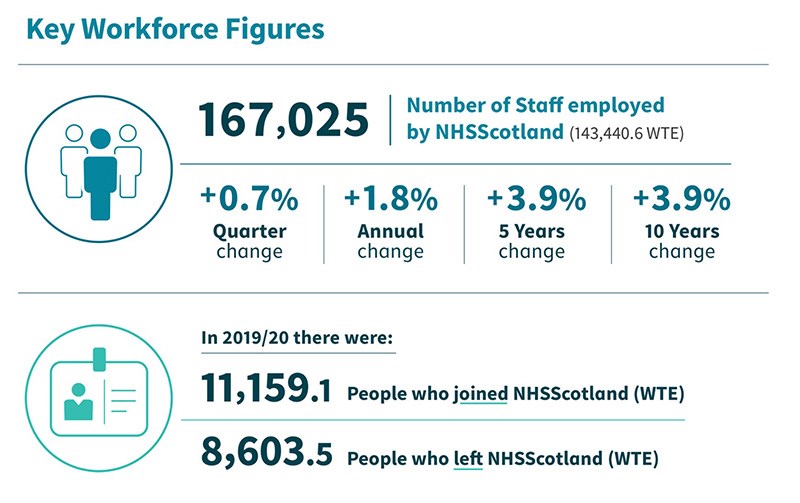NHS Scotland Workforce to 31 March 2020

NHS Scotland Workforce to 31 March 2020
Official workforce statistics for the core NHSScotland workforce, Psychology Services and CAMHS (Child and Adolescent Mental Health Services) have been published by NHS Education for Scotland (NES) on the NES Turas Data Intelligence platform.
Key points are:
1. NHSScotland Core Workforce
This publication provides a quarterly update for 31 March 2020 on data including the number of staff directly employed by NHSScotland, and the number of vacant posts for nursing and midwifery staff, allied health professions, and medical and dental consultants. Data on the cost of Medical agency locums, Bank and Agency nursing staff and the number of dentists working in Scotland are also available.
- There were 167,025 staff employed by NHSScotland, the highest reported to date and a 1.8% annual increase. The Whole Time Equivalent (WTE) has also grown by 1.8% over the same period to 143,440.6 WTE.
- The Nursing and Midwifery staff group is the largest in NHSScotland, accounting for 60,811.8 WTE (42.4%) of the workforce. It has increased by 1.2% over the past year.
- There were 13,749.3 WTE Medical and Dental staff in post, an annual increase of 2.7%. Doctors in Training and Consultants account for 44.4% (6,110.8 WTE) and 39.9% (5,488.7 WTE) of the Medical and Dental workforce, respectively.
- There were 12,065.3 WTE Allied Health Professions in post, an annual increase of 1.5%.
2. Psychology Services and CAMHS Workforce
These publications summarise national data on the workforce providing Psychology and CAMHS Services in NHSScotland, following the latest census on 31 March 2020. Data include the number and characteristics of clinical staff in post, and the numbers of trainees in Doctorate and MSc Courses.
- Within Psychology Services in NHSScotland, there were a total of 1214.1 WTE (1,475 headcount) clinical staff in post as at 31 March 2020. This is 91.4% (579.7 WTE) higher than in September 2006, 3.2% (37.8 WTE) higher than reported 12 months previously and 0% (0.3 WTE) lower than the December 2019 census.
- In addition to the Doctorate in Clinical Psychology (DClinPsych), MSc Psychological Therapy in Primary Care (MSc PTPC) and MSc in Applied Psychology for Children and Young People (MSc APCYP), NES works in partnership with NHS Boards to provide the British Psychological Society’s Stage 2 Training in Health Psychology. Trainees on each of these courses are employed by the NHS during training.
- Since 2009, there have been aligned training pathways on the DClinPsych with the aim of increasing capacity in specific areas of the psychology workforce. At the current census, of the 199 trainees working towards Doctorate in Clinical Psychology, 36 were aligned to CAMHS, 26 to Forensic Psychology and 32 to Older Adults.
- Significant Scottish Government funding has been invested in CAMHS since 2009 for workforce and trainee expansion.
- There were 1,040.3 WTE staff in post within NHSScotland CAMHS, an increase of 386.6 WTE (+59.1%) since 2006, 46.8 WTE (+4.7%) since 31 March 2016, and decrease of 9.9 WTE (-0.9%) since 31 March 2019 census. Of the total staff in post, 5.5% of staff were on maternity leave and 1.6% were on long term sick leave.
- As at 31 March 2020, three professional groups made up 78.3% of the WTE CAMHS workforce: Nursing (443.5 WTE, 42.6%), Psychology (275.5 WTE, 26.5%) and Medical (95.6 WTE, 9.2%).
June, 02 2020
